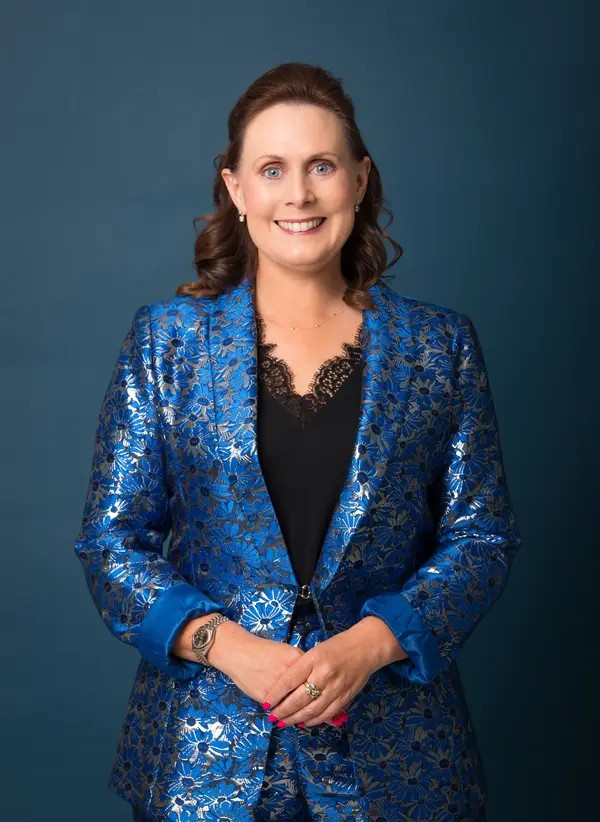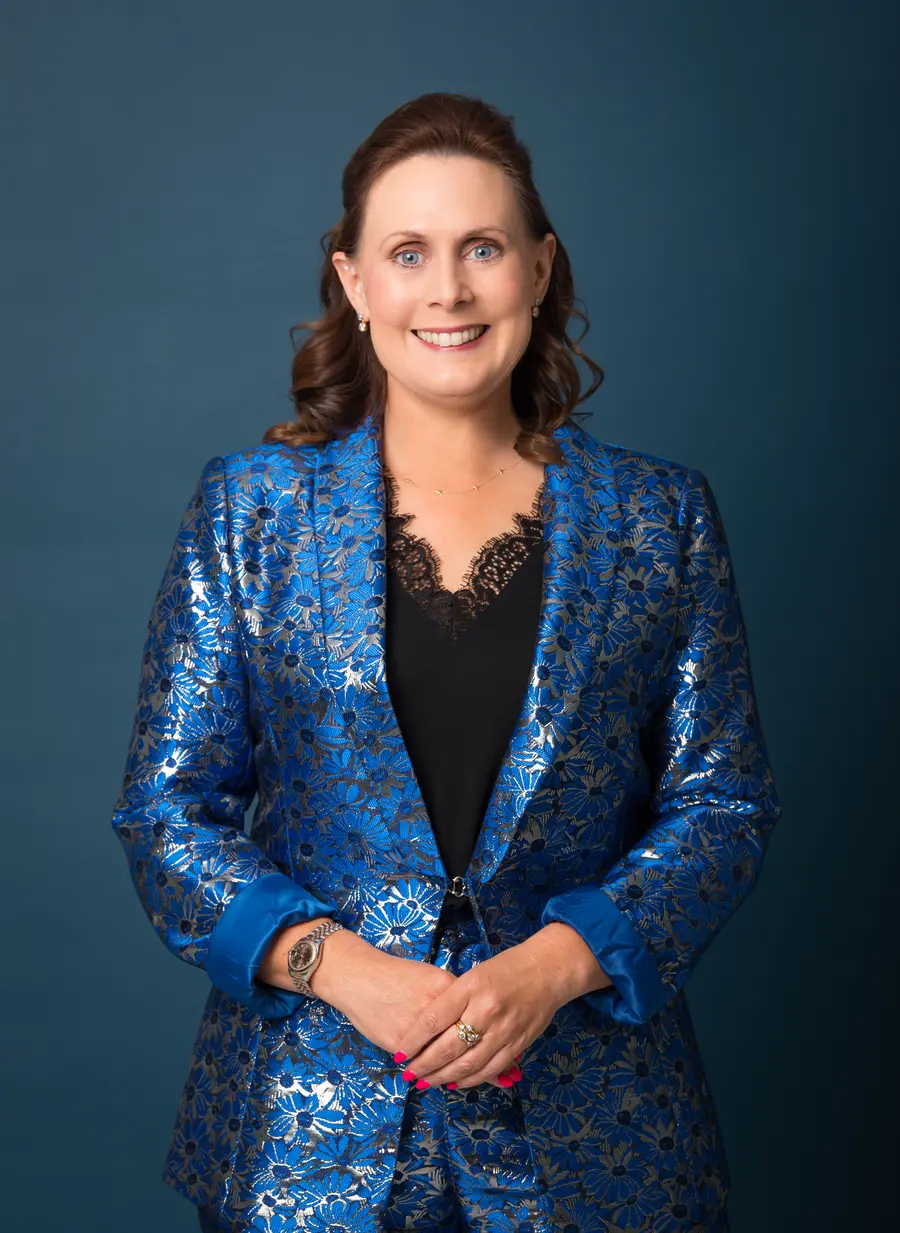
Caroline Reidy, Managing Director of the HR Suite and HR and Employment Law Expert. Caroline is a former member of the Low Pay Commission and is also an adjudicator in the Workplace Relations Commission.
Caroline is also an independent expert observer appointed by the European Parliament to the Board of Eurofound. Caroline is also on the Board of the Design and Craft Council Ireland and has been appointed to the Governing Body of Munster Technology University.
She also completed a Masters in Human Resources in the University of Limerick, she is CIPD accredited as well as being a trained mediator. Caroline had worked across various areas of HR for over 20 years in Kerry Group and in the retail and hospitality sector where she was the Operations and HR Director of the Garvey Group prior to setting up The HR Suite in 2009. She has also achieved a Diploma in Company Direction with Distinction with the Institute of Directors. She also has written 2 books, has done a TEDx and is a regular conference speaker and contributor to national media and is recognised a thought leader in the area of HR and employment law. Caroline also mentored female entrepreneurs on the Acorns Programme. Originally from Ballyheigue, Co. Kerry living in Dublin is very proud of her Kerry roots.
The HR Suite
With offices in Dublin, Cork and Kerry and a nationwide client base of SME's and multinationals, The HR Suite has over 600 clients throughout Ireland and employs a team of HR Advisors who offer clients expert HR advice, training, third party representation and other HR services.
The HR Suite has been acquired by NFP, an Aon Company, a leading global insurance broker. This expands the range of services on offer to their clients such as Health and Safety, Outplacement, Employee Benefits, and Pensions.
Julie Holmes is an HR Professional who joined the Knowledge team at Legal Island in June 2022. Using her extensive experience in Human Resources and L&D to help organisations attain key strategic objectives, Julie enjoyed the challenges of working across a range of sectors. She is an Associate Member of the CIPD. In her spare time, Julie is an enthusiastic gardener and member of the Irish Garden Plant Society. She is also a fan of scary movies (the parts she sees from behind a cushion anyway!)
Ireland’s new auto-enrolment scheme is going live and for HR teams, that means real changes to contracts, payroll, and how you communicate with staff. Yet, as RTÉ recently reported, 1 in 4 organisations still haven’t begun preparing.
So, ask yourself: is your organisation ready? Or just hoping it all falls into place?
Whether you're well underway or just getting started, this short, focused webinar will help you:
• Understand your obligations and what’s changing
• Spot potential payroll and contract pitfalls
• Sense-check your approach with expert insight
• Hear how other employers are planning their response
Led by Caroline Reidy, MD of the HR Suite and one of Ireland’s most respected HR experts, the session will offer clear, practical guidance. Hosting the conversation is Julie Holmes from Legal Island, who’ll ask the questions that matter, including how to talk about pensions without everyone leaving the room.
You’ll leave with fresh insight, real-world examples, and the confidence to take the next step, whether you’re already well-positioned or still catching up.
Transcript:
Julie: Good morning, everybody. Welcome to our webinar "Auto-Enrolment: What HR Needs to Know and What You Need to Do". My name is Julie, and I'm part of the Knowledge Team at Legal-Island, and I just want to thank you for joining us today.
Auto-enrolment pensions are coming to Ireland, and for the first time, employers are going to be legally required to contribute to their employees' pensions. The initiative aims to bring about 750,000 workers in Ireland without a pension into retirement savings, which is great news.
For employers, it's not about if you're ready, but how ready you are. What we're going to do today is cut through the noise and get clear on what you really need to know.
Today's guest is Caroline Reidy, Managing Director of The HR Suite. Good morning, Caroline. Thank you very much for being here.
Caroline: Morning, Julie.
Julie: And just to let everybody know, although there won't be slides for this presentation, you will have the recording sent to you shortly. So that's fine. Feel free to take notes as you go along but be comforted that you will be able to go back and refer to anything again.
Now, for any of you that haven't met Caroline, I'm going to tell you a little bit about her. Caroline is a past member of the Low Pay Commission. She's also an adjudicator in the Workplace Relations Commission. On top of all that as well, I will say she's a fantastic TEDx speaker and also a book author as well.
Aside from all of that, she's also CIPD accredited, as well as being a trained mediator. And as if that wasn't enough, she's worked across various areas of HR for over 20 years prior to setting up The HR Suite. So you know you're in good hands with Caroline.
I also want to take a moment to thank our sponsors, who are MCS Group, and they sponsor all of Legal-Island's webinars and podcasts. MCS help people find careers that match their skill sets perfectly, and they also support employers to build high-performing businesses by connecting them with the most talented candidates in the marketplace. So if you're interested in finding out a little bit more about how MCS can help you, then you can head to www.mcsgroup.jobs and find out a little bit more.
One of the great things about these webinars and getting everybody together is finding out how we're all doing and where we all are in relation to pensions. So we've got a couple of poll questions for you.
Gosia, if you don't mind bringing up the first one for us, please. And again, some of them are tongue-in-cheek because I think, again, talking about pensions, we all just need to have a bit of humour about it too.
So first of all, how do you feel about auto-enrolment arriving? There have been a couple of false starts. Your options are relieved that it's finally moving forward. Again, we were behind the rest of Europe in bringing it forward. Are you overwhelmed by yet another compliance deadline? You're probably working on gender pay gap at the moment, pay transparency directive next year, and just one more thing on your to-do list. And then last of all, how many of you are actually thinking, "I'm going to retire before 1 January 2026, and then I can just avoid this whole thing altogether"?
Just press the button, choose your option, and let us know where you are. So the results are coming in. Thanks very much for those of you that have had a chance to participate and press the button for us.
So we're finding that most of you, 62%, are relieved that it's finally moving forward. Again, a few people are feeling overwhelmed. So Caroline, glad you're here to keep everybody right and let us know what we should be working on. And there are a few people, and I think I'm in your boat as well, who say, "Let's look at retiring instead of maybe having to deal with auto-enrolments". It's one of those options instead of heading for the hills, I think.
Next one then. If we go to the next poll question, which will just take Gosia a little moment to bring up. And then, again, fingers on the buttons, everybody. We're going to look at now "How ready is your organisation for auto-enrolment pensions?"
Now, remember, it's anonymous. We're not going to call anybody out, so be honest. And again, let Caroline know where she needs to aim this talk today.
So how many of you are fully geared up, you're confident, you know what you're doing, and you could probably add a thing or two to this webinar for us, which is great. Some of you may think that you've made some progress, but still aware that there's work to do. Just want to have a checklist and maybe see what else there is that you need to cross off that list. And some of you are thinking, "Julie, if you have the number of a fairy godmother, let's give her a call because it's starting to feel just that little bit tantamount".
I'd said to Caroline earlier on I'm not too sure how she feels about being called fairy godmother of auto-enrolment. Maybe not one of the best titles, Caroline, you've had before, but I think that there's at least 29% that are very appreciative of your expertise in that today.
All right. So it's very encouraging to see that most people have made some progress, again, trying to work ahead of that January deadline. Sixty-four per cent of you have said that you've made good progress, but still a little bit of work to do. And 7% are very confident, fully geared up, confident, and are maybe just attending this to find out any of the finer things or any other little ideas. That's great. Make sure that you add to the comments any tips that you have for everybody else.
And we'll have one more poll question. What is your biggest barrier to auto-enrolment readiness at the moment?
So is it uncertainty about how auto-enrolment works with your existing pension scheme? Is it about payroll systems, the integration, and how that might need re-engineered or replaced?
Is it about day-to-day HR? You can't get the headspace to look at auto-enrolment because there's something else demanding your time otherwise. Or last of all, is it about explaining pensions clearly to employees, making them aware of things like that opt-out, but then also that you'll be in touch with them in a couple of years' time to see if they want to be enrolled again, explaining about the pension pots and how it's invested? Which of those are you finding the most challenging at the moment?
So Caroline, a little bit more variance about this. Again, it may match what you were already telling me before about your clients, about uncertainty about how auto-enrolment works with existing occupational pension schemes.
Eighteen per cent say that payroll systems may need re-engineered or replacing. Fourteen per cent, again, there's something that always shouts louder than auto-enrolment, and it's just getting that time to be able to work on it. Hopefully that will help you today with that. And then last of all, explaining pensions clearly to employees without losing it, without losing their attention, and that would be 23%.
Does that kind of fit, Caroline, with what people are telling you so far?
Caroline: Yeah, very much so, and I definitely think the fact that there are so many compliance obligations. For many organisations, looking at pay transparency and looking at auto-enrolment is like a project that they're tackling together because it is, I suppose, a career and rewards culture shift, really.
In Ireland in general, there would be a lot of secrecy around people not telling people what they're on. Many people joke and say many couples actually don't know what the other person is fully earning or what their full benefits are, not to mind now in an organisation where this is going to be a lot more transparent.
So I think that's a key focus as well, that culture shift, because it is going to change the landscape very much in organisations.
Julie: Great. Everybody, that was great. Thank you for participating in that and just giving us all a bit of an idea about where everybody is. Very encouraging to hear that everybody's well on the way. And again, Caroline's talk today will only enhance that for you.
So Caroline is going to give her presentation, and then we'll have a chance for Q&A. You'll see that up in the top right-hand box, there's a little box with a question mark in it. That's where you can just drop your questions in. We'll try and get through as many of those as we can before the webinar finishes at about quarter to 12.
All right. So I'm going to remove myself from the screen, give Caroline some space to have a chat with you, and again, I look forward to catching up with you in just a few moments.
Caroline: Thanks, Julie. So, firstly, I hugely appreciate the high attendance at today's webinar. I suppose we always are delighted to work with Julie and the team in Legal-Island. And also, my job, I always feel, is to try and make this as practical as I can, to help you identify maybe areas that you need to focus on as part of your actions going away from today's session.
I suppose I'm going to start with a little bit of the backdrop. Ultimately, we know that people are living longer and retirement support is more than is needed, and the retirement path needs to be supplemented. We've seen that the state pension age is remaining at 66, but there is a change in our legislation which now allows and encourages people to work up to the age of 70. And we also know that there is a piece of legislation in train that means we can't make people compulsorily retire below the state pension age in terms of contractual.
Retirement in general is very much on people's agendas. We've seen lots of cases around equality to do with retirement, where somebody wants to work on and the company needs to objectively justify how they manage that.
But now we're taking it a step further with two key pieces of legislation. Pay transparency is one, and again, we're doing lots of webinars around pay transparency because it's so topical, combined with auto-enrolment being the two key pieces of legislation that are going to really impact your reward and benefit strategy.
I suppose the aim from an organisational perspective also is to see this as an opportunity versus just a compliance driver, because there is an opportunity to review your benefits and rewards philosophy, your policy, your culture, and also to assess your job architecture.
We've heard a lot more talked about in terms of job architecture, which is ultimately how we categorise jobs together and how we reward in relation to those categories, to make sure that we can objectively justify the logic behind it, to make sure that is objectively justified and not linked in any way to direct or indirect gender discrimination.
Also, I suppose this is an opportunity to look at how we manage progression in terms of how long somebody is here and how maybe benefits might be assessed. And it's also an opportunity for benchmarking.
Many organisations we've found in the last few months are coming to us to say, "Look, we're not sure for our type of organisation, should we be looking at a company pension scheme? Would that be better for our employees? Would that be more attractive? Or should we stick with auto-enrolment?"
So again, around that piece of retention and attraction of staff, identifying your approach to that, looking at benchmarking, and looking at your own philosophy are key.
We've seen in the poll survey we did earlier that communicating proactively to your team is going to be key to this. And that's, I suppose, an important element that we need to keep into consideration here.
For many employees who may be in your company pension scheme, the company pension scheme may give them very little communication. They may not get a statement every year. It may not be explained to them very well.
So ultimately, this is an opportunity to make sure that if you have a scheme already in place, you're making sure that your employees know about it and appreciate how it is a retention tool that they'll think about in line with their overall package if, for example, they were thinking of maybe looking elsewhere.
This element of pensions currently in Ireland means we just have a PRSA after six months' service, but it's a voluntary opt-in. This PRSA scheme means that employers don't have to contribute to the scheme, but employers can have their own occupational pension scheme in place. But if they do, they set their own terms linked to it.
I suppose Ireland is the only OECD country without some form of pension in place, so we're absolutely catching up in relation to that. And that European Directive obliging us to is also encouraging us in relation to pensions, pay transparency, etc.
So who's eligible? Employees aged between 23 and 60 who earn over €20,000 annually will be automatically enrolled into auto-enrolment based on meeting their PRSI criteria. Anybody who's earning less or who's outside of the age range will not be opted in initially.
Workers already covered by private pension schemes are exempt. And ultimately, at the moment, the bar is set at once it's greater than zero in the private scheme, you've met the requirement that you have an occupational pension scheme in place.
However, there is a commitment that that will be reviewed in not more than six years with the assistance of NAERSA and the Pensions Authority to maybe identify if there needs to be guidelines around making sure that somebody who is in auto-enrolment and somebody is in a company pension scheme, they're not disadvantaged by being in the company's scheme. But that's down the tracks. There's no confirmation of what that will look like at the moment.
It's also important to note that there are opt-out options. And we know that with the opt-out options based on the UK, ultimately people will want to opt out. However, the whole concept of the scheme is that they will be automatically enrolled again to try and encourage the maximum uptake in relation to it.
I suppose the pension scheme in Ireland in terms of auto-enrolment is going to be known as My Future Fund. That's what it has been named.
There will be no minimum service requirement to joining the scheme. So once you join the company, you're automatically joined in terms of the scheme.
There are differences insofar as currently in most pension schemes, the employee can make what's called AVCs, which are additional voluntary contributions. And in the My Future Fund, employees won't have that option. So for your potential people who might be getting additional bonuses, etc., and they may want to put them into the pension to avoid paying tax, ultimately they won't be in a position to do this with My Future Fund.
The way it works as well is that contributions are based off the total gross pay that somebody earns, but there is a maximum threshold of €80,000. And up to that, the employee, employer, and the government are going to be paying into the pot, but at €80,000, that's the threshold. And the idea, I suppose, is that the government are putting in a contribution, but you're not getting tax relief on it as well.
For somebody who's earning more than €80,000, it is likely . . . And again, that's one of the actions, I suppose, from this type of a session. It's to assess which is more relevant to your employees. Likely, if somebody is earning more than €80,000, a private scheme will be better. For employees less, it is going to be an assessment of your employees. But that is an important consideration for you as you assess what's most beneficial and what's most suitable.
The concept is that the pot follows the member. So ultimately, if the employee leaves and goes to another job, the pot follows them. If the employee goes abroad, the pot is frozen until they come back. It can be reignited again.
Ultimately, there are a lot of employer obligations linked to this whole initiative, and one of the key requirements is to make sure that you provide information and access to the scheme if you are an eligible employer and if you don't have a company pension scheme. So it's going to require, again, a rethinking of how we do that and how we communicate that, etc.
Employers can retain the private scheme. There is no minimum contribution for now, remember, once it's greater than zero.
And the really important exercise, again, for you to consider right now is does the payroll system accommodate this easily? We've identified with clients that many systems don't. They've had to change and upgrade to facilitate auto-enrolment.
Remember, noncompliance is designed to lead to fines and penalties, and the WRC is going to look after how that's going to be managed. So again, it's important that you know those key things that you're considering now so you're prepared.
I suppose from a timeline perspective, as Julie mentioned, the auto-enrolment has been on the cards for the Irish government for some time. The Retirement Saving Act was signed into legislation in July 2024. The Commencement Order was signed in September 2024. NAERSA was set up in March 2025, and the new CEO, Dermot Griffin, is now in place.
The auto-enrolment system is due to start in January, but there are some murmurs that that might be March. So again, we'll keep you updated in relation to that, but at the moment, it is January.
They have appointed Tata Consultancy Services to administer the auto-enrolment. And ultimately, I suppose, it's the pension element that's going to be managed by NAERSA, who are that new body.
How it will, then, is Revenue are going to provide the necessary data to NAERSA. Employees who are eligible for auto-enrolment are identified by NAERSA, and notifications are sent to you, their employer. And then you're responsible for informing the employees and also informing them of their opt-out obligations.
The communication plan that you're doing around this is really important, because of those 750,000 to 800,000 people, if they're within your cohort, they will be asking questions in relation to the scheme.
Also, we've already noticed that both employee representatives and employees in general are also asking questions about their current pension schemes where they wouldn't have necessarily before. So the spotlight is encouraging everybody, I suppose, to . . .
And from Years 1 to 3, which is the starting phase, both the employer and the employee will pay 1.5% each, and the government will pay a top-up of 0.5%. Years 4 to 6, it goes up to 3% from the employer and the employee, and 1% from the government. Years 7 to 9, it's 4.5%, 4.5%, and 1.5% from the government. And in Years 10 on, its 6% from the employer, 6% from the employee, and 2% from the government.
Again, ultimately, kind of a steep increase in cost and also an administrative element to it, even though it's been promoted as there won't be any administration additionally required from an employer perspective. So far, based on what I've said, you know that whoever is responsible for payroll particularly and for induction and for exiting in terms of exit interviews, etc., that onboarding process will need to include information in relation to this and also the offboarding process.
The management of the fund I mentioned. And ultimately, the fund will have a default option, which is basically if you don't choose which one you want, they will decide which is the most appropriate for you based on what stage you're at prior to retirement.
You can choose low risk, medium risk, or high risk so that your funds will be invested on your behalf as an employee in relation to auto-enrolment, managed in this way.
Obviously, if you've got a company pension scheme, it's managed by pension trustees. It's a different type of approach. So again, another element of consideration linked to that.
The auto-enrolment won't have any early access in general at the moment it is expected, unless there are potentially exceptional ill-health circumstances. And then that will be assessed by NAERSA to decide if somebody can get early access or not. However, again, in a company scheme, there are a lot more options around early access.
The same in relation to the pay-out options. It's going to be a lump sum payment, or the purchase of a retirement annuity, or the transfer to an approved retirement fund. And that option is still being confirmed. As we mentioned, it's in the early stage of things being ironed out. So again, we'll keep you updated in relation to more clarity around those things.
In circumstances of the misfortunate death of an employee before retirement, the fund will go automatically to the person's estate. So again, it's important to kind of know what are the differences between both.
And remember, it'll be Year 6, which is what they're saying, before they really do a full assessment of the scheme. So it could be a couple of years before they do that, i.e. do a comparison between "Do they set down a specific minimum contribution rates in the company scheme?" But at the moment, that's not confirmed. As I say, it's mentioning Year 6.
So employees can opt out of the scheme six months after auto-enrolment, and there's a two-month window for employees to confirm their decision to opt out. They can also suspend their participation for six months after auto-enrolment, and they can suspend for one year or for two years.
Ultimately, I suppose it's managing the communication around making sure that employees can re-enrol after two years once they meet the correct eligibility criteria.
I mentioned that this whole area is going to be managed in terms of compliance with the Workplace Relations Commission. And key elements, I suppose, are linked to making sure that somebody isn't being hindered from accessing the scheme and the scheme is available, and also making sure that the employer pays the contributions.
So again, there are offences up to €5,000 in fixed-term payments, and there's imprisonment and more serious things if the employer was to refuse access to the scheme.
I suppose there's still a lot to iron out. And the fact that NAERSA is literally only in place since the end of March and the new CEO has just gone into position in the last number of weeks, ultimately we're still waiting for those practical frequently asked questions to be finalised. And like most pieces of legislation, the devil is in the detail, and the portal is going to be key to that.
I suppose it's really important that we're getting ready to try and see how, from a practical point of view, we're going to manage it. But some of those finer details will be closer to the time.
One criterion that I'm surprised they didn't put in was . . . Usually, it would be after probation, so maybe after six months of commencement, that you would join the scheme. The fact that everybody is joining from the outset, I think, is something we just need to be mindful of because, as I say, it needs to then be captured at induction.
For some companies, it makes sense that they've got a single scheme. So you decide, "Actually, auto-enrolment suits us best". Or you may decide that a dual scheme is best, that you have auto-enrolment for one cohort and you have an in-house pension scheme for a different cohort. Again, we are luckily in the position to be able to help and advise clients in relation to which is the best option.
And equally, if you have a current pension scheme, now is the time to assess, "Is that best value? Is it fit for purpose?" And again, we'd be delighted to talk to any of you in relation to assistance in that regard, because we have pensions experts within our team who can give you that expert advice.
We need to be clear here that there are two elements to this. One is from an HR perspective, preparing the policies, the documents, the communication, etc. But there's also the financial, the payroll, and the element of making sure that you're making the right decision of which scheme is best to suit your cohort of employees and what rates, etc., are appropriate to your type of employment.
So again, I would really encourage you to consider that as a priority, and as I say, happy to help in that regard.
Also, making sure your payroll system is fit for purpose is really important. Again, managing your data compliance in terms of how you're going to make sure that you give people the option to opt out, re-opt them in after the period of time when they're leaving, etc. So again, making sure that that's key.
I suppose education and support for employees, ideally, you're starting sooner rather than later. And once you've done your preparation in relation to the administration of which scheme is going to work and the training for your managers, your payroll, and your HR, for me the most important next step is your communication plan. That's really important to avoid employees feeling that they're being left in the dark and they're not sure what's happening.
Obviously, I mentioned already the ice cream ad. There's a lot of focus on it in the media.
In terms of your contracts and your policies, you need to update your contract of employment and policies regarding any types of leave, your starter form, your exit form, etc.
It may need consultation and engagement with your employees and with your unions. And we've already seen many of our clients have been involved in union conversations and consultation in relation to it. Again, making sure you have your position clearly identified before you engage is obviously important. That communication and engagement is important. Again, you're trying to avoid any issues along the way.
Some key things to think about is what is the financial impact of auto-enrolment in your budget? We have a lot of clients who work in sectors like contract cleaning or catering, etc., and they do tenders for work. So for them, they're looking at what the potential implication of auto-enrolment is.
We know that sick pay and the Statutory Sick Pay, which was paused last year, is also coming up for review in the October budget as well. So again, what is the financial impact on your payroll of those types of initiatives? Make sure you build them in.
I suppose, again, what about your existing scheme? Does that need to be reassessed? Are you getting the best value in terms of what you're paying for fees, etc.? Do you need to think about auto-enrolment, or do you need to consider a private scheme better than auto-enrolment based on the cohort of staff? So again, look at that benchmarking so that you're ahead of that.
And I suppose that communicate, communicate, communicate is going to be key. I'm going to invite Julie on in a minute to kind of focus on the queries that you have. But one of the key elements to this being a success is going to be making sure that your employees, your managers, and your payroll, etc., are all on the same page.
One of the key things we're identifying with clients is combined with the project around pay transparency, which is identifying your job categories, your job families, and your job architecture, they're doing a full benefits review to say, "Do I need to reassess my pension? Do I need to reassess my health benefits that I give employees, and do I actually need to put pay bands? How am I going to look at this?" So from an HR perspective, it's a very busy last quarter of the year in terms of preparation.
Julie, delighted to welcome you back and see if our attendees have any additional questions. And hopefully, that was a good overview in terms of the questions we're getting from clients. I very much focussed on what was most topical, so hopefully that resonates with a lot of your listeners this morning.
Julie: Yes. Great. And everybody has submitted their questions, so thank you very much.
I think, Caroline, you touched on so much there. And again, it's really just about people thinking about that, looking at their own systems, as you said, and benchmarking.
Now, when we're speaking about benchmarking and we're talking about systems integration, one of the questions that has come through a lot is almost about this idea of existing occupational private schemes at the moment and trying to, again, adapt or look at those in relation to auto-enrolment.
One specific question was about some payroll providers not having the systems configured yet or available for testing. Are you finding that that is quite common, or are you finding that it's . . .
Caroline: Yeah, it's causing a lot of nervousness, to be honest, with a lot of clients, because ultimately, as I mentioned, the deadline at the moment is 1 January. There are murmurs, but that's all they are. There's nothing to say that it may be delayed until March, but that isn't an official position.
If it's happening then, people are very conscious that Christmas is obviously one of those months that there's so much going on that people don't want to be there in December worried about this.
I would say I would be really pressing your payroll provider to say by October at the latest, end of October, you would need to be confident and comfortable that they can do what's required in relation to auto-enrolment. If not, you need to reconsider providers. Technology is brilliant if it works, but as we know, if it doesn't, it's a real concern.
In an area like this where it's so topical . . . We mentioned that cohort of people, those 750,000 to 800,000 people that have been identified. But what we're noticing is we've a lot of clients that might have a big percentage of that cohort based on the type of industry that they are in.
If you're one of those that knows, "Oh, I have a big cohort here", that will cause you more worry than you being an employer who today is listening thinking, "We have a company pension scheme. Ultimately, we are not as exposed here or at risk in terms of how this is going to provide a big impact".
But I would really encourage the payroll system and the decision of "Which is best for our strategy?" because it is very much going to be something now that people are going to be talking about. They're going to be saying, "So, Julie, what's your pension contribution?" You'll be saying, "It's X", and I'll be going, "Well, I'm getting this". All of a sudden, what was something that people, I would say, didn't even think about as a benefit . . .
And ultimately, as well, I would say from your current provider, I would be saying, "Are you happy with the level of communication that's there?" Because I do think getting a statement making people aware of what they're getting already is really important now so that they can see the company position.
If you're not one of the employers who has a load of people impacted by auto-enrolment, I would still be encouraging you to do the communication, except it'll be a really big positive exercise that you're doing for that cohort of employee to really make them feel they're well looked after.
That's why it's creating, I suppose, a review for a lot of people to say, "Let me take stock here. What are we actually planning to do going forward around retention and reward?"
Julie: One of the other themes . . . and Caroline, thank you very much for answering that about the private scheme. Again, it's about this integration. So somebody has asked about their own . . . it's an existing scheme where, when a company has a probationary period, maybe you don't allow an employee to join in the first six months.
But again, looking at the legislation and what way things are going to change, that looks like that's not going to be possible, and employers are going to be in a position where they may have to run dual schemes, which I know isn't the answer maybe that people want.
Caroline: So at the moment, the way the guidance is positioned, once you have a scheme . . . The way it's worded, actually, is it is greater than 0%. You meet the eligibility criteria.
So if you remember, the Statutory Sick Pay legislation is somewhat similar, which says if you have company pensions or sick pay scheme, etc. But it's clear at the moment that once you have a scheme that's greater than zero, they're not going to get into the detail of the scheme per se.
However, your employees, I would say, from an industrial relations and a morale perspective, etc., may say, "Well, that's not fair. I can do auto-enrolment then", and you'll have potential employees who want to join auto-enrolment.
So what we're finding is to facilitate, I suppose, that positivity, etc., is people are looking at, "What do we need to do to our current scheme to align it to auto-enrolment so that it's seen as an enhancement?"
For most employers who do have company schemes in place, they want it to be better than the standard. That was one of the things that I flagged as what I would consider . . . I wouldn't have encouraged that. Let's put it like that.
I do think that it's a really good milestone, like the effort of starting somebody and putting them on. Also, attrition rates in certain sectors in that first six months is high, but the legislation is the legislation at the moment. They fit the criteria that between 23 and 60, they need to be enrolled. And that €20,000, ultimately, you've got to guesstimate that they're going to be earning that amount.
I would say, again, it's back to that point of the strategy of the organisation to say, "Do we want to be better than the standard? Are we happy to field employee questions if they raise that, etc.?"
Julie: Great. Thank you. We're nearly out of time, Caroline. So, Gosia, I'm just going to ask you to . . .
Caroline: It always flies, Julie. We always manage to . . .
Julie: It does. You've heard Caroline, you've heard how clear, what guidance she gives, which is fantastic. And Legal-Island ourselves, we are having our Annual Review of Employment Law, and one of the people speaking at it is Caroline. Again, she'll be there to talk about hybrid working this time, Caroline, isn't it?
Caroline: I'm really looking forward to it.
Julie: It's always a good event. I believe that we have some nice surprises as well to avail of, too. So that'll be a nice thing to look forward to. That's in Dublin, and it's 27 November.
The nice thing about the event is that you can choose to attend in person so that you can see Caroline live, you can meet all of us, get those goodie bags, all those types of things that you love to see. Or if you're trying to continue working in between, then you can also attend live, and then you can choose which sessions you attend and work your meetings and everything else around that too.
So I just wanted to mention that, and also that Caroline has provided a new article for us for our Knowledge Hub as well. We would love you to take a free trial for that. So again, take a look and see what there is. There are case reviews. There are tonnes of resources.
Caroline has written about the importance of managers, as much as she's mentioned today about the importance of managers in relation to auto-enrolment, having your clinics, having your communication strategy, and preparing as much as possible for what sounds like a fantastically great tool in relation to employee benefits and retention. It's just working our way through it to make sure that it's all set up as seamlessly as possible.
So if we just go on to the next slide. Again, Caroline has very kindly said to everybody about getting in contact if you need that little bit more support in relation to looking at how auto-enrolment is working for you.
There are a lot of questions, I think, from companies that already have something in place, and you're trying to figure out how it integrates with what you have at the moment and, as Caroline said, making all those changes, and also with the related HR processes as well.
You'll see that HR Suite has tonnes of different specialities around employee benefits, HR solutions, health and safety, commercial insurance, and also wealth management. Again, great resource for you as well.
Caroline, were you just going to mention to us as well about your change in name, just to start making people aware of that?
Caroline: Thanks, Julie. So we are part of NFP, who are an Aon company, and we are rebranding this winter. The good news, I suppose, is everything stays the same in terms of the service and team that you're used to in The HR Suite. But we are now able to assist you with employee benefits, which is very opportune based on the topic we've spoken about today.
If you need to review your current scheme, if you need advice in relation to the technicalities, etc., we're there to help in terms of the wider team with that and with areas like insurance, etc. Same values, same approach as ourselves, so I think you'll get a lot of benefit from that.
Thanks, Julie, for that.
Julie: That sounds fantastic, Caroline. And same high standards. So again, thank you.
Thank you, everybody, again for your time and attending. I hope that that was helpful. And thank you very much to those people that are sending little reactions and letting us know that that hit the mark for you, in what was a very short session, but again, lots of information packed in there.
I'd also like to thank Caroline for providing such fantastic information for us and, again, setting things with clarity. Again, that practical experience, Caroline, just shines through. It's not just all about the one side of it. It's about how it really meshes through so many other processes as well.
And thanks very much to my colleague, Gosia, setting up the polls and trying to keep us all going as well, to make sure that we all get the best from the webinar.
So thanks very much, everyone.
Caroline: Thanks, everybody.
Julie: It's been lovely having you. We look forward to seeing you next time. Take care and have a good afternoon.
Caroline: Thanks, all.
Julie: Thanks.
Sponsored by:
 AI Literacy Skills at Work: Safe, Ethical and Effective Use
AI Literacy Skills at Work: Safe, Ethical and Effective Use







